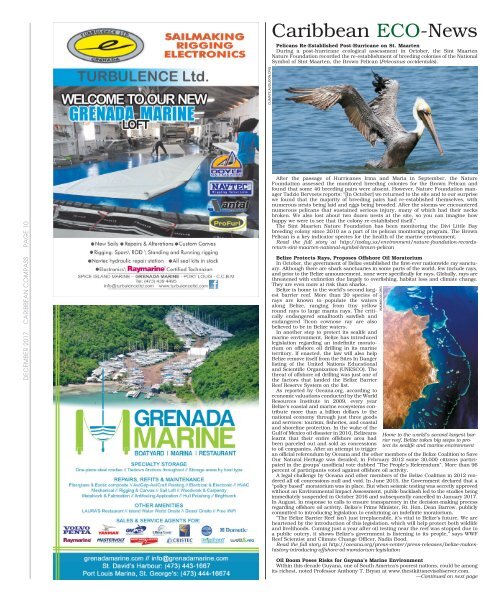Caribbean Compass Yachting Magazine - December 2017
Welcome to Caribbean Compass, the most widely-read boating publication in the Caribbean! THE MOST NEWS YOU CAN USE - feature articles on cruising destinations, regattas, environment, events...Welcome to Caribbean Compass, the most widely-read boating publication in the Caribbean! THE MOST NEWS YOU CAN USE - feature articles on cruising destinations, regattas, environment, events...
Welcome to Caribbean Compass, the most widely-read boating publication in the Caribbean! THE MOST NEWS YOU CAN USE - feature articles on cruising destinations, regattas, environment, events...Welcome to Caribbean Compass, the most widely-read boating publication in the Caribbean! THE MOST NEWS YOU CAN USE - feature articles on cruising destinations, regattas, environment, events...
You also want an ePaper? Increase the reach of your titles
YUMPU automatically turns print PDFs into web optimized ePapers that Google loves.
<strong>Caribbean</strong> ECO-News<br />
Pelicans Re-Established Post-Hurricane on St. Maarten<br />
During a post-hurricane ecological assessment in October, the Sint Maarten<br />
Nature Foundation recorded the re-establishment of breeding colonies of the National<br />
Symbol of Sint Maarten, the Brown Pelican (Pelecanus occidentalis).<br />
DECEMBER <strong>2017</strong> CARIBBEAN COMPASS PAGE 10<br />
CLIMATE.AUDUBON.ORG<br />
After the passage of Hurricanes Irma and Maria in September, the Nature<br />
Foundation assessed the monitored breeding colonies for the Brown Pelican and<br />
found that some 40 breeding pairs were absent. However, Nature Foundation manager<br />
Tadzio Bervoets reports: “[In October] we returned to the site and to our surprise<br />
we found that the majority of breeding pairs had re-established themselves, with<br />
numerous nests being laid and eggs being brooded. After the storms we encountered<br />
numerous pelicans that sustained serious injury, many of which had their necks<br />
broken. We also lost about two dozen nests at the site, so you can imagine how<br />
happy we were to see that the colony re-established itself.”<br />
The Sint Maarten Nature Foundation has been monitoring the Divi Little Bay<br />
breeding colony since 2010 as a part of its pelican monitoring program. The Brown<br />
Pelican is a key indicator species for the health of the marine environment.<br />
Read the full story at http://today.sx/environment/nature-foundation-recordsreturn-sint-maarten-national-symbol-brown-pelican<br />
Belize Protects Rays, Proposes Offshore Oil Moratorium<br />
In October, the government of Belize established the first-ever nationwide ray sanctuary.<br />
Although there are shark sanctuaries in some parts of the world, few include rays,<br />
and prior to the Belize announcement, none were specifically for rays. Globally, rays are<br />
threatened with extinction due largely to overfishing, habitat loss and climate change.<br />
They are even more at risk than sharks.<br />
Belize is home to the world’s second largest<br />
barrier reef. More than 20 species of<br />
rays are known to populate the waters<br />
along Belize, ranging from tiny yellow<br />
round rays to large manta rays. The critically<br />
endangered smalltooth sawfish and<br />
endangered Ticon cownose ray are also<br />
believed to be in Belize waters.<br />
In another step to protect its sealife and<br />
marine environment, Belize has introduced<br />
legislation regarding an indefinite moratorium<br />
on offshore oil drilling in its marine<br />
territory. If enacted, the law will also help<br />
Belize remove itself from the Sites In Danger<br />
listing of the United Nations Educational<br />
and Scientific Organization (UNESCO). The<br />
threat of offshore oil drilling was just one of<br />
the factors that landed the Belize Barrier<br />
Reef Reserve System on the list.<br />
As reported by Oceana.org, according to<br />
economic valuations conducted by the World<br />
Resources Institute in 2009, every year<br />
Belize’s coastal and marine ecosystems contribute<br />
more than a billion dollars to the<br />
national economy through just three goods<br />
and services: tourism, fisheries, and coastal<br />
and shoreline protection. In the wake of the<br />
Gulf of Mexico oil disaster in 2010, Belizeans<br />
learnt that their entire offshore area had<br />
been parceled out and sold as concessions<br />
to oil companies. After an attempt to trigger<br />
an official referendum by Oceana and the other members of the Belize Coalition to Save<br />
Our Natural Heritage was derailed, in February 2012 some 30,000 citizens participated<br />
in the groups’ unofficial vote dubbed “The People’s Referendum”. More than 96<br />
percent of participants voted against offshore oil activity.<br />
A legal challenge by Oceana and other members of the Belize Coalition in 2012 rendered<br />
all oil concessions null and void. In June 2015, the Government declared that a<br />
“policy based” moratorium was in place. But when seismic testing was secretly approved<br />
without an Environmental Impact Assessment, public backlash led to the studies being<br />
immediately suspended in October 2016 and subsequently cancelled in January <strong>2017</strong>.<br />
In August, in response to calls to ensure transparency in the decision-making process<br />
regarding offshore oil activity, Belize’s Prime Minister, Rt. Hon. Dean Barrow, publicly<br />
committed to introducing legislation to enshrining an indefinite moratorium.<br />
“The Belize Barrier Reef isn’t just irreplaceable, it’s vital to Belize’s future. We are<br />
heartened by the introduction of this legislation, which will help protect both wildlife<br />
and livelihoods. Coming just a year after oil testing near the reef was stopped due to<br />
a public outcry, it shows Belize’s government is listening to its people,” says WWF<br />
Reef Scientist and Climate Change Officer, Nadia Bood.<br />
Read the full story at http://oceana.org/press-center/press-releases/belize-makeshistory-introducing-offshore-oil-moratorium-legislation<br />
WIKIMEDIA.ORG<br />
Home to the world’s second largest barrier<br />
reef, Belize takes big steps to protect<br />
its sealife and marine environment<br />
Oil Boom Poses Risks for Guyana’s Marine Environment<br />
Within this decade Guyana, one of South America’s poorest nations, could be among<br />
its richest, noted Professor Anthony T. Bryan at www.thestkittsnevisobserver.com.<br />
—Continued on next page


















